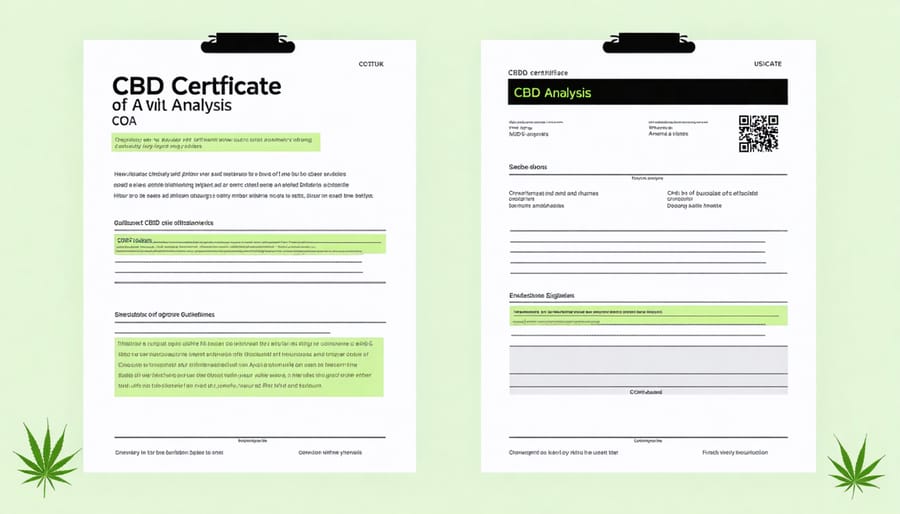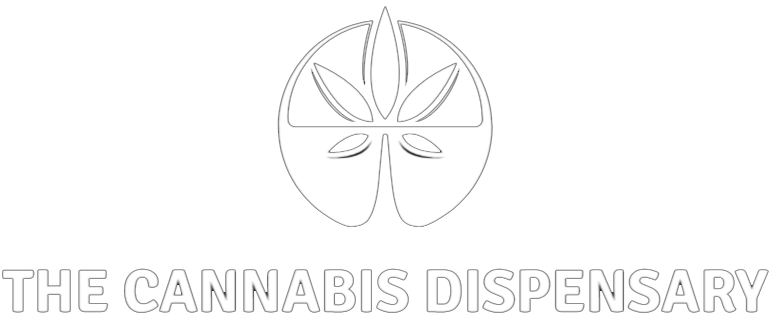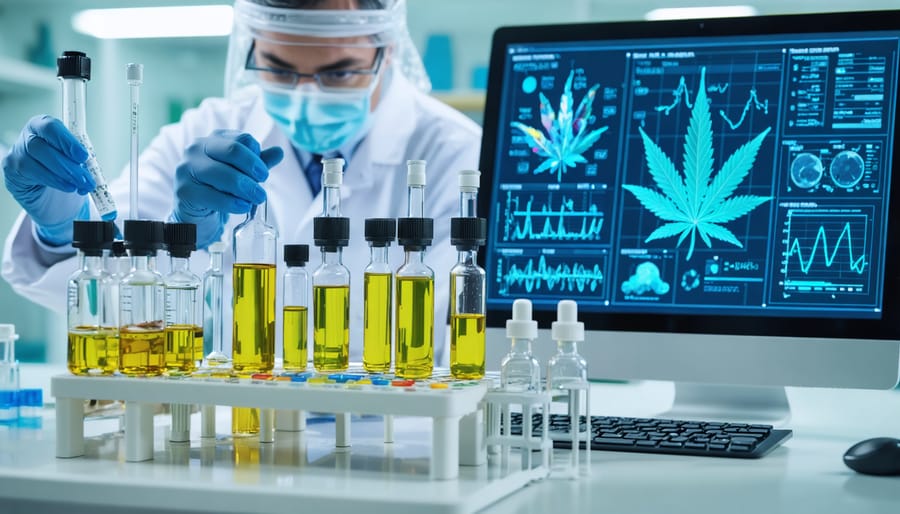CBD Oil Quality Testing: What Your Lab Results Really Mean
Verify CBD oil authenticity through comprehensive third-party lab reports, focusing on cannabinoid profiles, contaminant testing, and terpene analysis. In CBD Canada, establishing data-driven quality standards has become essential for product validation. Demand certificates of analysis (COAs) that include heavy metal screening, pesticide testing, and microbial analysis from every manufacturer. Cross-reference batch numbers between product labels and lab reports to ensure consistency and transparency.
Quality CBD oil production requires rigorous testing at multiple stages – from raw hemp analysis through final product verification. Modern extraction methods, including CO2 and ethanol-based processes, must maintain strict temperature and pressure controls to preserve cannabinoid integrity. Independent laboratory validation confirms potency claims, ensuring products deliver the advertised CBD concentration while remaining free from harmful contaminants.
Reputable manufacturers implement comprehensive quality management systems, documenting every step from seed to shelf. This includes validated testing protocols, established acceptance criteria, and complete batch records that demonstrate consistent production standards. Understanding these quality assurance measures empowers consumers to make informed decisions about their CBD purchases.

Essential Quality Markers in CBD Oil Testing
Potency and Cannabinoid Profile
A critical aspect of CBD oil quality assurance is understanding its potency and cannabinoid profile through comprehensive laboratory testing. These tests measure the exact concentration of CBD and other cannabinoids present in the product, ensuring that what’s on the label matches what’s in the bottle.
Quality CBD oils undergo full-spectrum analysis that identifies and quantifies various compounds, including CBD, THC (which must be below 0.3% for legal hemp products), minor cannabinoids like CBG and CBN, and beneficial terpenes. This complete profile helps consumers understand the potential entourage effect and therapeutic benefits of their product.
Reputable manufacturers provide detailed Certificates of Analysis (COAs) that show precise cannabinoid percentages. When reviewing these reports, pay special attention to CBD potency, ensuring it matches the advertised concentration. For example, if a product claims to contain 1000mg of CBD per bottle, the lab results should confirm this amount within an acceptable variance range.
Remember that consistent potency across batches indicates reliable manufacturing processes and quality control standards. This consistency is essential for users who rely on specific dosages for their wellness routines.
Contaminant Testing
Contaminant testing is a crucial component of CBD oil quality assurance, ensuring products are safe for consumption. During cannabis cultivation methods and processing, various unwanted substances can potentially contaminate the final product. Quality manufacturers conduct comprehensive testing for three main categories of contaminants.
Pesticide testing screens for harmful agricultural chemicals that might have been used during cultivation. While some pesticides are approved for hemp growing, their residual levels must fall within strict safety limits. Heavy metal testing checks for dangerous elements like lead, mercury, arsenic, and cadmium, which plants can absorb from soil and water. These substances can be particularly harmful if consumed, making this testing step essential.
Microbial testing identifies potentially dangerous organisms like bacteria, mold, and yeast. This includes screening for E. coli, salmonella, and aspergillus, among others. Proper testing ensures the product is free from harmful microorganisms that could pose health risks. Reputable manufacturers will provide certificates of analysis (COAs) showing detailed results from all these tests, demonstrating their commitment to consumer safety and product quality.
Terpene Analysis
Terpene analysis is a crucial component of CBD oil quality testing that examines the aromatic compounds naturally present in hemp plants. These compounds not only contribute to the oil’s distinctive smell and taste but also play a significant role in its therapeutic effects through what’s known as the entourage effect. Quality testing laboratories use gas chromatography to identify and measure specific terpenes like myrcene, limonene, and pinene. A comprehensive terpene profile helps verify the oil’s authenticity and potential benefits, as specific terpene combinations can enhance relaxation, focus, or other desired effects. When reviewing lab reports, look for detailed terpene breakdowns that show both the types and concentrations present, as this information indicates both product quality and likely effectiveness.
Understanding Third-Party Lab Reports
Key Components of a COA
A Certificate of Analysis (COA) contains several critical sections that help verify CBD oil quality. The cannabinoid profile is typically listed first, showing the concentrations of CBD, THC, and other cannabinoids present in the product. This section confirms the product’s potency and ensures THC levels comply with legal limits.
The terpene profile details the aromatic compounds that contribute to the oil’s effects and flavor. While not all COAs include this information, it’s valuable for understanding the product’s complete profile.
Heavy metals testing results are crucial, indicating levels of harmful substances like lead, arsenic, mercury, and cadmium. These must fall below specific safety thresholds. Similarly, the pesticide analysis confirms the absence of harmful agricultural chemicals.
Residual solvents testing is essential for CBD oils produced using extraction methods involving solvents. This section verifies that any remaining solvents are within safe limits. Microbiological testing checks for harmful bacteria, yeast, and mold that could compromise product safety.
The COA should also include basic information like the testing facility’s name, sample identification, test date, and batch number. This information helps trace the product’s origin and ensures you’re viewing results for your specific product batch.
Look for a clear pass/fail indication for each test category, making it easier to quickly assess the product’s overall quality and safety.

Red Flags to Watch For
When shopping for CBD oil, certain warning signs can help you identify potentially low-quality or misleading products. Be wary of oils that lack a certificate of analysis (COA) from an independent, third-party laboratory. A missing or outdated COA is a major red flag that could indicate the product hasn’t been properly tested.
Watch out for unusually low prices compared to market standards. While everyone loves a good deal, quality CBD extraction and testing are expensive processes. If the price seems too good to be true, it probably is.
Be skeptical of products making outlandish medical claims or promises of miracle cures. Legitimate CBD companies follow regulatory guidelines and avoid making unsubstantiated health claims. Similarly, products advertising “no THC” but lacking test results to prove this claim should be approached with caution.
Check the CBD concentration listed on the label against the laboratory results. Significant discrepancies between these numbers are concerning and may indicate poor quality control or deliberate misrepresentation. Also, be cautious of products that don’t clearly state the total CBD content per bottle or serving.
Pay attention to the testing lab’s reputation. Some companies use in-house testing or work with laboratories that aren’t accredited. Look for tests from ISO-certified labs with a track record of reliable results. If the lab seems obscure or you can’t find information about it online, consider this a warning sign.
Watch for products lacking basic information like batch numbers, manufacturing dates, or clear ingredients lists. Transparency is crucial in the CBD industry, and reputable manufacturers proudly share these details with consumers.
Industry Standards and Certifications
GMP Certification
Good Manufacturing Practices (GMP) certification represents a crucial quality standard in CBD oil production, ensuring consistent product quality and safety. These internationally recognized guidelines cover every aspect of the manufacturing process, from raw material handling to final product packaging.
For CBD manufacturers, GMP certification requires maintaining clean, controlled environments, implementing detailed documentation systems, and following strict standard operating procedures. This includes regular equipment calibration, employee training programs, and thorough batch testing protocols.
Key elements of GMP certification in CBD production include:
– Detailed documentation of all production processes
– Regular facility and equipment maintenance
– Proper storage and handling of materials
– Quality control testing at multiple stages
– Employee training and hygiene protocols
– Contamination prevention measures
By choosing CBD oils from GMP-certified facilities, consumers can feel confident that their products are manufactured under stringent quality control standards. These facilities undergo regular audits by third-party certification bodies to maintain their GMP status, ensuring ongoing compliance with quality standards.
While GMP certification isn’t currently mandatory for all CBD manufacturers in every region, it represents the gold standard in production quality. Companies that voluntarily pursue and maintain GMP certification demonstrate their commitment to product safety and quality, making them more reliable choices for conscientious consumers.

USDA Organic Certification
USDA organic certification represents one of the highest standards for CBD oil quality and purity. To earn this prestigious certification, hemp farms and manufacturers must meet strict guidelines that prohibit the use of synthetic fertilizers, pesticides, and genetically modified organisms (GMOs). These sustainable production practices ensure that the hemp plants are grown in clean soil without harmful chemicals.
The certification process involves rigorous documentation and regular inspections of farming operations, processing facilities, and handling procedures. Manufacturers must maintain detailed records of their production methods, including seed sources, soil management practices, and pest control measures. They’re also required to implement strict measures to prevent cross-contamination with non-organic materials.
Choosing USDA organic certified CBD oil offers several benefits. First, it guarantees that your product is free from synthetic pesticides and harmful chemicals. Second, organic farming practices help preserve soil health and protect local ecosystems. Third, certified organic products undergo additional quality control measures, which often result in higher-quality end products.
While organic certification does increase production costs, many consumers find the additional expense worthwhile for the assurance of purity and environmental stewardship. When shopping for CBD oil, look for the USDA organic seal and verify the certification number to ensure you’re getting a genuine organic product.
Choosing Quality-Assured CBD Products
Verification Steps
To ensure you’re getting high-quality CBD oil, follow these essential verification steps:
First, always request the Certificate of Analysis (COA) from the manufacturer. This document should be readily available and current, typically dated within the last 12 months. Check that the testing was conducted by an independent, third-party laboratory.
Review the cannabinoid profile in the COA, which should clearly show CBD content matching the label claims. Look for THC levels to ensure they’re within legal limits (usually under 0.3%). The document should also include test results for potential contaminants like heavy metals, pesticides, and residual solvents.
Examine the product packaging for crucial information including:
– Batch number matching the COA
– Manufacturing date and expiration date
– Full ingredient list
– CBD content per serving
– QR code linking to lab results
Verify the extraction method used. CO2 extraction is considered the gold standard for safety and purity. Research the hemp source – domestic cultivation under organic practices is preferable.
Look for quality indicators such as amber glass packaging to protect from light degradation, clear dosage instructions, and transparent company information. Responsible manufacturers will provide customer service contacts and detailed product information on their website.
Remember that a higher price doesn’t always guarantee better quality. Focus on verification documentation and company transparency rather than cost alone.
Questions to Ask Manufacturers
When evaluating CBD oil manufacturers, asking the right questions can help ensure you’re getting a high-quality product. Start by inquiring about their hemp sourcing – where it’s grown, whether it’s organic, and what cultivation practices they follow. Ask about their extraction methods and why they chose that particular process.
Request detailed information about their third-party testing protocols. How often do they test? Which laboratory do they use? Can they provide recent Certificates of Analysis (COAs) for review? A reputable manufacturer should be transparent about their testing procedures and willing to share results.
Inquire about their quality control measures throughout the production process. What steps do they take to prevent contamination? How do they ensure consistent CBD concentrations across batches? Ask about their Good Manufacturing Practices (GMP) certification and any other relevant industry certifications.
Don’t hesitate to ask about their product formulation. What carrier oils do they use? How do they determine their CBD concentrations? What measures do they take to ensure the THC content stays within legal limits?
Finally, ask about their company’s standard operating procedures for handling customer complaints and product recalls. A manufacturer committed to quality should have clear protocols in place and be willing to stand behind their products with appropriate guarantees or return policies.
Remember, trustworthy manufacturers welcome these questions and respond with detailed, transparent answers.
Quality assurance in CBD oil selection is not just about following a checklist – it’s about ensuring your wellness and safety while making informed decisions. Throughout this guide, we’ve explored the crucial elements that contribute to CBD oil quality, from third-party testing and certificate of analysis interpretation to understanding extraction methods and sourcing practices.
Remember that reputable manufacturers prioritize transparency and readily provide detailed information about their testing procedures and quality control measures. By focusing on factors such as organic cultivation, clean extraction methods, and comprehensive lab testing, you can make confident choices about the CBD products you purchase.
As the CBD industry continues to evolve, staying informed about quality standards and testing requirements becomes increasingly important. Take time to research manufacturers, read lab reports, and understand what goes into your CBD oil. Your health and wellness deserve nothing less than products that meet the highest quality standards.
Always choose CBD oils from companies that demonstrate commitment to sustainability, transparency, and consumer education. This approach not only ensures you receive a superior product but also supports the development of a more responsible and trustworthy CBD industry.


